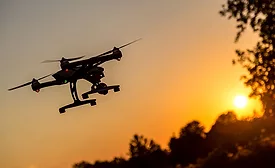Home » drone security
Articles Tagged with ''drone security''
Drones: A Security Tool, Threat and Challenge
Benefits, risks, challenges and advice for drones in enterprises in 2018.
March 9, 2018
LiveSky Tether-Powered Drone System
Enables Long-Duration Aerial Surveillance
March 1, 2018
Top Security Guarding Companies Report 2017
Contract Security Industry Continues Growth, But Will Humans Necessarily Keep Driving It?
December 1, 2017
Sign-up to receive top management & result-driven techniques in the industry.
Join over 20,000+ industry leaders who receive our premium content.
SIGN UP TODAY!Copyright ©2025. All Rights Reserved BNP Media.
Design, CMS, Hosting & Web Development :: ePublishing






